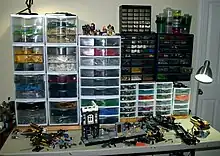.jpg.webp)


Lego fandom is the fan community that exists around the Lego toys.[1]: 164 [2]: 248–249
While Lego is primarily seen as a children's toy, there are a significant number of adult fans of Lego (AFOL).[3]: 119
Adult fans of Lego
Adult members of the Lego fandom are called adult fans of Lego (AFOL).[4]: 221 [5]: 227 Many AFOLs design complex sets, known as MOCs ("My Own Creation"), using computer software such as LDraw or MLCAD for their planning. Such sets are often intended for public display during various events and some have attracted media attention, such as Sean Kenney's model of the Yankee Stadium, a six-foot-wide (1.8 m) and five-foot-long (1.5 m) construction of 45,000 pieces, created over a period of three years, or Mark Borlase's Star Wars Hoth diorama of 60,000 bricks and four-year construction time.[3]: 123–124 Many AFOLs have dedicated "Lego rooms" in their houses.[3]: 124
Activities of more dedicated AFOLs go beyond creating Lego models, and include attending Lego conventions, participating in online Lego communities, and less often, cosplay, writing fanfiction or drawing fan art.[2]: 248–249
Large AFOL conventions include events such as Brickworld, BrickFair or Bricks by the Bay.[3]: 123
Many AFOLs self-identify as "geeks" or "nerds".[3]: 123 In the United States, in the mid-2010s, most AFOLs were white, college-educated males in their 20s or 30s, although as time goes, the age of the average member of the community is steadily increasing, as more people who grew up with Lego become middle-aged or older.[3]: 121–122 AFOLs usually played with Lego sets as kids, and rediscovered the hobby at some later time in their nostalgic adulthood.[3]: 123, 125
The LEGO company recognizes the AFOL community as an important part of its customer base and maintains a number of outreach programs connecting it to the fan community.[2]: xxvi In some cases, entire official Lego sets can be seen as intended not for children but for adult fans.[6]
See also
- List of Lego conventions
- LUGNET
- The Art of the Brick
References
- ↑ Booth, Paul (2018-02-26). A Companion to Media Fandom and Fan Studies. John Wiley & Sons. ISBN 978-1-119-23717-4. Archived from the original on 2023-02-02. Retrieved 2023-01-29.
- 1 2 3 Lee, Jonathan Rey (2020-09-08). Deconstructing LEGO: The Medium and Messages of LEGO Play. Springer Nature. ISBN 978-3-030-53665-7. Archived from the original on 2023-02-02. Retrieved 2023-01-29.
- 1 2 3 4 5 6 7 Garlen, Jennifer C (2013-11-07). "Block party: A look at adult fans of LEGO". In Barton, Kristin M.; Lampley, Jonathan Malcolm (eds.). Fan CULTure: Essays on Participatory Fandom in the 21st Century. McFarland. ISBN 978-0-7864-7418-9. Archived from the original on 2023-02-02. Retrieved 2023-01-29.
- ↑ Jennings, Nancy A. (2019-11-27). ""It's All About the Brick": Mobilizing Adult Fans of LEGO". In Hains, Rebecca C.; Mazzarella, Sharon R. (eds.). Cultural Studies of LEGO: More Than Just Bricks. Springer Nature. ISBN 978-3-030-32664-7. Archived from the original on 2023-02-02. Retrieved 2023-01-29.
- ↑ Cook, Roy T.; Bacharach, Sondra (2017-06-13). LEGO and Philosophy: Constructing Reality Brick By Brick. John Wiley & Sons. ISBN 978-1-119-19398-2. Archived from the original on 2023-02-02. Retrieved 2023-01-29.
- ↑ Garlen, Jennifer (2011-11-15). "Virtual Virago: Block Party: A Look at Adult Fans of LEGO". Virtual Virago. Archived from the original on 2023-01-21. Retrieved 2023-01-21.
